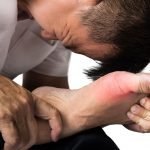Discreet Disposable Pelvic Floor Muscle Trainer May Aid Bladder Leakage in Women
Node Smith, ND
Commissioned by pelvic floor muscle trainer Pelviva, the research of 2,000 women aged over 40 confirms this is one of the biggest areas of female public health, which demands immediate attention by all healthcare professionals.
An urgent issue: more women are suffering from bladder leakage than hayfever, migraine or even coughs and colds
There are more women suffering from bladder leakage than hayfever, migraine or even coughs and colds, demonstrating the opportunity for Pharmacy. Out of the Two-thirds of women who are currently suffering with bladder leakage, it leaves them feeling embarrassed and depressed as a direct result, the study found.
The condition, which can be caused by childbirth and often develops as women get older, affects millions of females. Nine in 10 sufferers said it has had a ‘major impact’ on their quality of life – and a tenth said bladder leakage has caused them to endure depression.
98% of women concerned about leakage in older age, and 55% of women believe bladder leakage is an inevitable part of aging
A staggering 98% of women are concerned about leakage in older age, and 55% of women believe bladder leakage is an inevitable part of aging.
17 percent of sufferers’ lives are ‘dominated’ by their bladder leaks.
64% of women wish they had understood the importance of having a healthy pelvic floor.
A sensitive condition and new strategies need to be adopted
This new data confirms the major opportunity for Pharmacy in providing a new service and developing major new business sector. It is important not to consider incontinence as a problem with aging – a large number of younger women also suffer from the condition – shown in other research to be as high as 1 in 3.
This is a sensitive condition and new strategies need to be adopted by pharmacy to start the conversation, provide advice to gain the patient engagement and trust – 59% of women haven’t even been open with their partners regarding their suffering.
Julia Herbert, consultant physiotherapist and clinical director for Pelviva said: Bladder leakage is a health issue which affects millions of women of all ages across the UK.
Some possible causes for weakening pelvic floor muscles
Pregnancy, childbirth, hormonal changes associated with the menopause and putting on weight are some of the many causes of bladder leakage due to weakening pelvic floor muscles. These issues are more commonly experienced by older women, but it can just as easily affect someone in their 30s or even younger.
Despite this high prevalence, bladder leakage is still seen as something of a taboo for women to discuss – they may find it hard to talk with their friends, family or even their partner, which is a perception we’d like to see change.”
The research also found one in 10 don’t feel they’re able to enjoy life fully as a result of the condition.
Ground-breaking national survey reveals for the first time ever the level of suffering of bladder leakage
This ground-breaking national survey reveals for the first time ever the level of suffering of bladder leakage in the UK. For decades, the feminine care industry has marketed incontinence and bladder leakage to the older woman when, in fact, it heavily impacts women in their thirties and forties. The focus on age as a determining factor in bladder performance has created a feeling of embarrassment around an issue that’s incredibly common for a younger woman.
A lack of market innovation led Femeda Ltd to develop Pelviva – a disposable, clinically effective, discreet and easy-to-use Pelvic Floor muscle trainer for the treatment of urinary incontinence (UI) in women.
Pharmacy is ideally placed as the key customer base reflects the core demographic of incontinence sufferers. Rather than have customers resigned to a life of pads, it is easy to identify sufferers having repeat prescriptions and the all too often co-prescribing of anti depressants.
Andrew Tasker CEO of Femeda Ltd said: There’s a huge opportunity for the pharmacist to start to play a fundamental role in helping women deal with bladder leakage – perhaps the single biggest issue in female health? The family doctor has limited resources to help and the majority of prescription options have questionable long-term benefits, and challenging side effect profiles, meaning it is the pharmacist who is ideally placed. It’s now time to start the conversion, provide patient advice support materials, moving customers from pads to new innovation which treats and solves the problem and financially rewards pharmacy for recommendation”
Pelviva
Pelviva provides a clinically proven treatment to address the root cause of the condition, meaning pharmacists should be at the forefront of driving change in female health, capitalizing on a unique margin opportunity and building footfall.
Pelviva has been shown to deliver a rapid onset of benefits delivering high levels of customer satisfaction – 80% of users experienced benefits in as little as 3 weeks…even including women who had been suffering for years”
Pads and liners have traditionally formed the incontinence category in pharmacy though with increasing presence of such products in grocery and similar stores, and increasing price competition, there is a need for innovation which reinforces pharmacy core values and strengths.
The Pelviva treatment
The Pelviva treatment is ideally suited to the trusted pharmacy environment where it’s possible to have the essential sensitive conversation with the customer in a discreet consulting room. Pharmacy can now recommend a life-changing solution. Pelviva provides a clinically proven treatment, enabling pharmacy to move women away from pads and liners, and further develop loyalty to their pharmacy.
Seventy percent of women said they have suffered bladder leakage when they have laughed, coughed or sneezed. And one in three have experienced symptoms when running, jumping or engaging in other physical activities. To try and combat bladder leakage, 23 per cent of sufferers said they are careful with how much they drink and 30 per cent always plan toilet stops while traveling.
One third make sure to wear absorbent pads and one in twenty even make effort to wear clothes which hides the fact they may have had ‘an accident’.
And a quarter said bladder leakage issues make them feel older than they really are.
Further to this, eight in 10 suspect more women suffer from bladder leakage than would actually admit it in public.
Dr Donna McVey, Medical Director at Pelviva said: “Being told to go away and do your pelvic floor muscle exercises is not helpful as medical evidence shows as many as 50 per cent of women can’t do their own pelvic floor muscle exercises correctly. This is through no fault of their own they simply do not have the connection to the pelvic floor.”
OnePoll found that although 96 per cent of women have heard of pelvic floor exercises, only 10 per cent actually do them regularly
The Pelviva survey carried out through OnePoll found that although 96 per cent of women have heard of pelvic floor exercises, only 10 per cent actually do them regularly. A fifth said they’re not sure if they know how to do pelvic floor exercises correctly and 23 per cent have attempted them but didn’t notice any improvement.
Julia Herbert, Physiotherapist and Clinical Director from Pelviva said: Pelvic floor exercises are a simple but oft-overlooked treatment for bladder leakage.
The Pelviva treatment has been designed to train your pelvic floor muscles correctly, and is completely automated and simple to use.
 Node Smith, ND, is a naturopathic physician in Humboldt, Saskatchewan and associate editor and continuing education director for NDNR. His mission is serving relationships that support the process of transformation, and that ultimately lead to healthier people, businesses and communities. His primary therapeutic tools include counselling, homeopathy, diet and the use of cold water combined with exercise. Node considers health to be a reflection of the relationships a person or a business has with themselves, with God and with those around them. In order to cure disease and to heal, these relationships must be specifically considered. Node has worked intimately with many groups and organizations within the naturopathic profession, and helped found the non-profit, Association for Naturopathic Revitalization (ANR), which works to promote and facilitate experiential education in vitalism.
Node Smith, ND, is a naturopathic physician in Humboldt, Saskatchewan and associate editor and continuing education director for NDNR. His mission is serving relationships that support the process of transformation, and that ultimately lead to healthier people, businesses and communities. His primary therapeutic tools include counselling, homeopathy, diet and the use of cold water combined with exercise. Node considers health to be a reflection of the relationships a person or a business has with themselves, with God and with those around them. In order to cure disease and to heal, these relationships must be specifically considered. Node has worked intimately with many groups and organizations within the naturopathic profession, and helped found the non-profit, Association for Naturopathic Revitalization (ANR), which works to promote and facilitate experiential education in vitalism.
Node Smith graduated from the National University of Natural Medicine (NUNM) in 2017, and is currently licensed as a naturopathic physician in Oregon and working towards becoming licensed in Saskatchewan, Canada as well.










